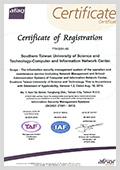Network Management
Traffic flow management
Traffic flow refers to the sum of the
inflow and outflow between the campus network and the external network
(including TANet network lines and other business lines). Measures that STUST
take to control its network traffic are as follows:
- When the traffic flow of any campus wired network IP exceeds its one-day upper limit, the network bandwidth of the IP be will limited until the next day (starting at midnight).
- When the traffic flow of any campus wired network user exceeds his/her one-day upper limit, the network bandwidth of the user and his/her WiFi card be will limited until the next day (from midnight).
- For those who have a large demand of traffic flow to meet their needs in teaching or research, please complete the "Special Traffic Application Form" 3 working days before the day of demand, and have it signed by the executive officer of your unit or office before sending it to CINC.
Current Traffic flow limit:
- One-day traffic flow maximum limit for each campus network IP is 6 GBytes.
- One-day traffic flow maximum limit for each wireless campus network user is 6 GBytes.
- If any use exceeds the maximum limit, bandwidth in use will be limited to 128Kbps.
Antivirus software
To reduce security problems, STUST has purchased Kapersky Antivirus software for teachers and students to keep their computer safe from virus
attacks. Please refer to the campus licensed software downloads.
Server management
Every unit must login in STUST e-portal and go to the Server Connection Application System to fill out the relevant information. The application must
be send to CINC before network services are provided.※Attention:
- Server information content shall be regularly inspected and recorded; conditions and situations must be tracked and handled properly.
- Antivirus software shall be installed and updated on a daily basis.
- Security updates shall be performed regularly to protect operating system and applications.
- Exceptional occurrences and information security matters shall be properly recorded for tracking; records shall be kept for one year for the sake of further investigation.
- Managers of Web Servers or FTP shall pay attention to any web content and its legality; information must be kept free from obscenity, offensiveness, and commercial activities, and computer programs without authorization or copyright must be excluded.
- Managers should participate in information security workshops that CINC holds regularly every year.









